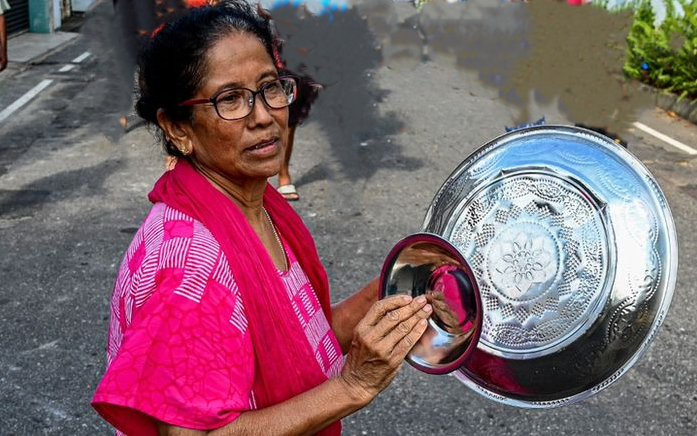Women in Sri Lanka demand economic justice in the face of the ongoing debt crisis.
Women’s rights groups in Sri Lanka reject the current debt restructuring solutions that place the burden of repayment on Sri Lanka’s working classes, particularly its women. They are demanding urgent and sustainable solutions to the ongoing debt crisis in Sri Lanka, that respond to the actual lived experiences, struggles and needs of the people.
At the ‘National Convening on Debt and Women’s Human Rights’ held in Colombo on 9-10 August 2023, women’s rights groups from Sri Lanka and other Asian countries discussed the ways the ongoing crisis has impacted their lives and the inadequacy of government solutions to respond in meaningful ways. They also severely criticised the historical and current roles played by international financial institutions mainly the World Bank and IMF in imposing unjust austerity measures and their lack of accountability in worsening economic crises in the region.
No public consultation
Sri Lanka is currently going through a crippling economic crisis because of an unsustainable debt burden of 103.8% of GDP as of March 2023. This crisis hit households at a time when many had not yet recovered from the shocks of COVID-19. The government response of austerity measures to secure an International Monetary Fund bailout are being hurriedly rolled out, with no public consultation. This has included cuts in public spending, steep increases in utility tariffs, food and energy costs, indirect and regressive taxation, limited cash handouts as social security.
This has particularly impacted low to middle income families, and labour laws that threaten to rollback gains in wage and job security, especially for women. Critically, the Government of Sri Lanka has decided to use the earnings of the Employee Provident Funds to repay Sri Lanka’s debt – forcing Sri Lanka’s working class to bear the burden of repaying the wealthiest creditors – and has blocked resistance and legal challenges to the same.
“The social security funds of workers are being compromised to pay the debt for the richest income earners in the world. The government has decided to trade off the savings – for many of them this is the only savings – of some of the most hardworking people in Sri Lanka,” said lawyer and activist, Lakmali Hemachandra. “There are severe violations going on with the domestic debt restructuring. The restructuring process is due to finish in September and by that time, workers will lose the security of their savings. We need the international community to hear and condemn the fact that creditors are being paid with workers’ savings and the Government and IMF is continuing to hold the position that there is people’s buy-in for this. There is no people’s buy-in, people just don’t have a way to communicate that,” Hemachandra said.
The Convening reaffirmed that women are disproportionately affected by both the economic crisis and current state solutions to restructure the debt. Due to their unpaid caregiving roles at the household level, women often shoulder responsibilities of ensuring families are fed, looked after and educated, even as they face falling wages, rising food, electricity and water bills, precarious and informal employment and lack of access to meaningful social security. “Households can only meet their basic food needs by taking daily loans, weekly loans and other borrowing at very high interest rates. We cannot manage basic needs with our income anymore. How is this fair?” said Suganya Kandeepan, Feminist Collective for Economic Justice.
Social security is not charity
Social security is not charity but a human right of all people. Women’s groups are demanding that universal social security in this time of crisis be made binding and enforceable by law. Without meaningful expansion of social safety nets and increasing fiscal allocation, targeted schemes like Aswesuma will not benefit the millions of families hit hard by the crisis. “In order to fund universal social security, we demand the government start taxing the rich, taxing corporations and reduce regressive consumer taxes like VAT with immediate effect, and expand budgetary allocation for social security beyond the current limit of 0.6% of GDP. We need to also expand social security to include other forms of support to relieve stress on household debt: guaranteed days of work, weekly nutritional food basket, health and education support, and transport support.” – Sarala Emmanuel, Feminist Collective for Economic Justice.
Juan Pablo Bohoslavsky, Former UN Independent Expert on Debt and Human Rights said, “We also need to question why only domestic creditors have been asked by the government to make a sacrifice and accept, to some extent, a haircut in their credit. External debt holders should also be asked to make a similar contribution to bring sovereign debt to a sustainable level. According to international law, in the Sri Lankan context, prohibition of discrimination means inter-creditor equity in sovereign debt restructuring.”
Sri Lanka is one of several countries in Asia and the Pacific currently grappling with the impacts of a debt crisis. Women’s rights groups across Asia Pacific have expressed solidarity with the people of Sri Lanka, with the Regional Coordinator of APWLD Misun Woo saying, “It is outrageous to hear countless similar stories of violence women go through in a debt crisis. Women’s stories across Asia and the Pacific confirm that there is a ‘debt formula’ which is a clear manifestation of neo-colonialism and imperialism that takes away peoples’ life, dignity and sovereign power. APWLD stands in solidarity with women and peoples of Sri Lanka and joins your struggles for justice and freedom. “
The national convening was co-organised by the Law and Society Trust (LST), National Fisheries Solidarity Organisation (NAFSO), The Women and Media Collective (WMC), Colombo Urban Lab, The Asia Pacific Forum on Women, Law and Development (APWLD). Participants included representatives from groups of labour activists, trade unions, rural and urban women, academia, and civil society from Sri Lanka and Asia.
